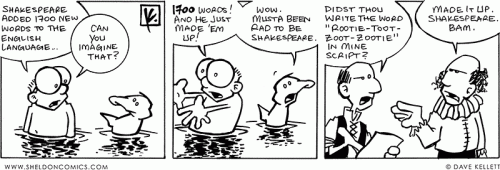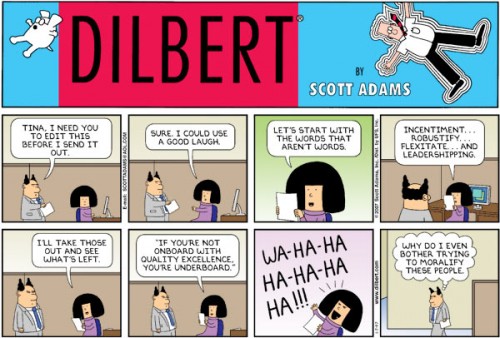Boobs And Books » Language » Is That a Word? It is Now!
Is That a Word? It is Now!
Is “truthiness” a word? The joke implies that it is not. But if it isn’t a word, then what is it? What makes a word a word? The fact that it’s in a dictionary?
But what happens before a word is a word? At some point, “fellatio” and “cunnilingus” were not words. At some point, the entire English language as we know it today “was not a word”.
Have you ever had the pleasure of being forced to read Shakespeare? Are any of those words words?
The Birth of Words
Shakespeare himself invented a word to mean “inventing words”: coining. (Actually, it was already a word. He invented a new metaphor.)
…words are owned by a community rather than an individual. If a word isn’t known to everyone around you, you might as well not use it, because no one will know what you’re talking about. Nonetheless, every word in a language must have been minted at some point by a single speaker… – Steven Pinker, The Stuff of Thought
I say it is a word, no matter how short lived. Its lifespan might only be that first and last utterance, never to be heard or seen or recorded in history, but does that make it any less precious? No, for in that moment, we enjoyed you, we cherished you, you brought us joy.
The mindless repetition of the word “spam” inspired late-1980s hackers to use it as a verb for flooding newsgroups with identical messages, and a decade later it spread from their subculture to the populace at large…But most silly coinages go nowhere, such as bushlips for “insincere political rhetoric” (after George H. W. Bush’s 1988 campaign slogan “Read my lips: No new taxes”), or teledildonics for computer controlled sex toys…And could anyone have predicted that “to blog”, “to google”, and “to blackberry” would quickly become part of everyone’s language? – Steven Pinker, The Stuff of Thought
Similar to species in the biosphere, almost all words that ever existed have gone extinct, and today, linguistic extinctions are happening at a frightening pace. So we need to keep creating words and meanings, for language is alive, growing, changing, exploring, expanding. Let’s keep it rich and vivid and human. Our language will die the moment it becomes yet another cold programming language for human drones.
The computer will automatically reject new words.
Syntax error!
As humans, do we want to mimic the dumb computer’s reaction?
Syntax error!
No, we can probe into each other, find out what we mean by the words we use. We can find new ways of expressing ourselves, because no language existing or past is all-encompassing enough to express every whim, every desire, every hue of our human existence. So we hone and refine, change and redefine. Let us use our language, and not let our language use us.

Check out sheldoncomics.com!
Two Wrongs Don’t Make a Right, but a Million Wrongs Just Might
As we shape our language to ever more closely match our Being, we open up the door to better understand each other, and thus better understand ourselves.
Don’t be afraid of making up new words. In fact, I’m going to make a new word to mean “not afraid of making up new words”: acoinophobic. I’m sure that’ll catch on.
“Incorrect” just means “does not follow the current rules”. And “incorrect” doesn’t mean we shouldn’t do it. Enough “incorrects” eventually become correct. “Cherry” for example, is the singular of “cherries”, which was imported from the French “cerise”, which is actually already singular. As we said before, today’s English is “not correct” compared to the “correct” English of 500 years ago, but we got to where we are today from the accumulation of “incorrects”.
Let’s be acoinophobic, for we are not only the users of yesterday’s language, but also the creators of tomorrow’s.
Filed under: Language · Tags: coining, evolution, Self, Shakespeare, words








